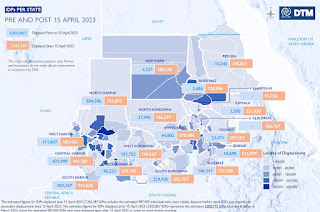THE International Criminal Court’s chief prosecutor Mr Karim Khan KC issued an urgent appeal today (Tuesday, 11 June 2024) in The Hague for information and evidence of atrocities in Darfur, Sudan, saying his ongoing investigation “seems to disclose an organised, systematic and a profound attack on human dignity.” Mr Khan called on international organisations, partners and national authorities to collect evidence and information and hand it over to him. View the appeal on video and two reports here below.
Provide evidence and information to the ICC here: https://otplink.icc-cpi.int
Note, Subtitles for this video can be viewed in different languages: click on above video, click on wheel "Settings", click on "Subtitles", click on "Auto translate", scroll "list of languages", click on language, desired Subtitles will appear at bottom of video. Size of font for Subtitles can be adjusted: click on wheel "Settings", click on "Subtitles", click on "Options" in top right corner. Playback speed for audio and Subtitles can be adjusted: click on wheel "Settings", click on "Playback speed", select speed.
Also, follow along using a Transcript here: https://youtu.be/2D2DYptFW8st
_______________________________
Report from The Washington Post
By MIKE CORDER, AP (The Associated Press)
Dated Tuesday, 11 June 2024 5:08 am EDT. Here is a full copy:
ICC prosecutor appeals for evidence of atrocities in Sudan after rebels attack hospital in Darfur
The International Criminal Court’s chief prosecutor is appealing for information and evidence of atrocities in Sudan’s western Darfur region
THE HAGUE, Netherlands — The International Criminal Court’s chief prosecutor appealed Tuesday for information and evidence of atrocities in Sudan, saying his ongoing investigation “seems to disclose an organized, systematic and a profound attack on human dignity.”
ICC Prosecutor Karim Khan released a video statement in the aftermath of an attack Sunday by the notorious Rapid Support Forces paramilitary group that forced the closure of a main hospital in the western Darfur region. The group fired shots and looted the hospital in al-Fasher, aid group Doctors Without Borders reported.
The attack came as the RSF, which has been fighting the Sudanese army for a year, intensified its offensive seeking to wrest control of the city, the military’s last stronghold in the sprawling Darfur region. Two weeks of fighting last month in and around al-Fasher has killed more than 120 people.
“The terrible events in West Darfur, including El-Geneina, in 2023 are among our key investigative priorities,” Khan said. “In addition, I am extremely concerned about allegations of widespread international crimes being committed in al-Fasher and its surrounding areas as I speak.”
A long-running conflict
Sudan’s conflict began in April last year when soaring tensions between the leaders of the military and the RSF erupted into fighting in the capital, Khartoum, and elsewhere in the country.
The war has killed more than 14,000 people and wounded thousands more, while pushing its population to the brink of famine. The U.N. food agency warned the warring parties last month that there is a serious risk of widespread starvation and death in Darfur and elsewhere in Sudan if they don’t allow humanitarian aid into the region.
The war also created the world’s largest displacement crisis as more than 10 million people have been forced to flee their homes, including over 2 million people who crossed into neighboring countries, the U.N. migration agency told The Associated Press Monday.
Khan said he is urgently investigating in Sudan.
“The evidence my office has collected to date seems to show credible, repeated, expanding, continuous allegations of attacks against the civilian population, in particular, attacks directed against camps for internally displaced persons,” he said.
“It seems to show the widespread, prevalent use of rape and other forms of sexual violence. It seems to disclose consistently the shelling of civilian areas, the looting of properties and attacks against hospitals,” he added, stressing that he was “particularly concerned by the ethnically motivated nature of these attacks against the Masalit and other communities.”
The ICC already has an ongoing investigation in Sudan
The ICC has long been investigating atrocities in Sudan, dating back to a previous devastating conflict in Darfur. The court has issued arrest warrants for former Sudanese President Omar al-Bashir on charges including genocide allegedly committed in Darfur between 2003-2008.
The RSF was born out of Arab militias, commonly known as Janjaweed, mobilized by al-Bashir against non-Arab tribes in Darfur. At the time, they were accused of mass killings, rapes and other atrocities, and Darfur became synonymous with genocide.
Khan referred back to the previous conflict in his message Tuesday.
“It is an outrage that we are allowing history to repeat itself once again in Darfur,” he said. “We cannot and we must not allow Darfur to become the world’s forgotten atrocity, once again.”
Photo [not shown here] caption: FILE - Sudanese soldiers from the Rapid Support Forces unit, led by Gen. Mohammed Hamdan Dagalo, the deputy head of the military council, secure the area where Dagalo attends a military-backed tribe’s rally, in the East Nile province, Sudan, on June 22, 2019. The RSF, attacked the South Hospital in al-Fasher, the capital city of North Darfur province on Sunday, June 9, 2024 opening fire on medical staff and patients, Doctors Without Borders said in a statement. (AP Photo/Hussein Malla, File)
View original: https://www.washingtonpost.com/world/2024/06/11/sudan-icc-investigation-khan-rsf-darfur/2e3324a8-27d2-11ef-835a-2a6acac1f8a6_story.html
_______________________________
Further Reading
From International Organisation for Migration (IOM) 11 June 2024:
DTM Sudan Mobility Update (02). IOM, Sudan
This report provides an overview of the total population of internally displaced persons (IDPs) in Sudan, including those displaced both before and after the onset of conflict on 15 April 2023.
____________________________
UPDATE by Sudan Watch Editor
On Wednesday, 12 June 2024 at 15:26 GMT:
The above video can be viewed at X in post by ICC 8:45AM June 11, 2024.
#ICC Prosecutor @KarimKhanQC announces campaign calling for information and cooperation in relation to allegations of international crimes being committed in #Darfur, Sudan, including in Al Fasher.
— Int'l Criminal Court (@IntlCrimCourt) June 11, 2024
Info can be sent to #OTPLink:https://t.co/IYVUCvyWCA
Watch 👇 pic.twitter.com/H1sMPGB8jP
END





.jpeg)
.jpeg)

